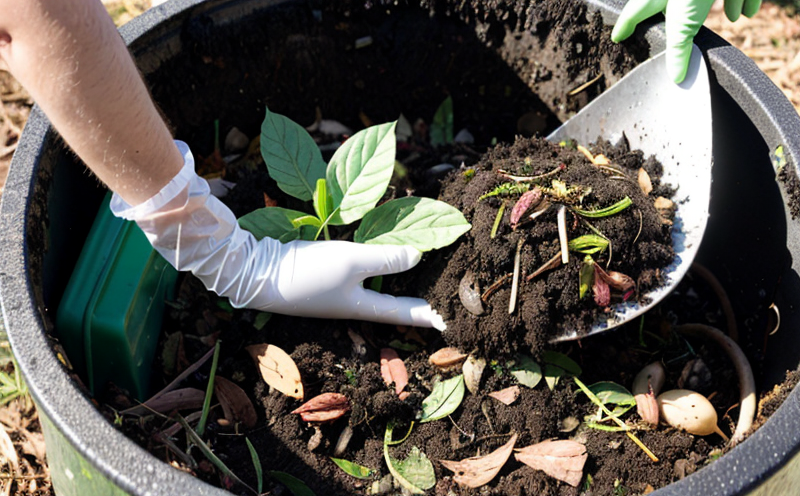EN 16087-1 Microbial Quality Testing of Compost
The European Standard EN 16087-1:2019 provides comprehensive guidelines for the microbial quality testing of compost. This standard is crucial for waste management and compost production, ensuring that the final product is safe for use in agriculture and horticulture.
Microbial contaminants can pose significant risks to human health if not properly controlled during the composting process. This test ensures that the finished compost does not contain harmful pathogens or excessive levels of other microorganisms that could cause disease when used in soil amendment applications. The standard covers key parameters such as aerobic mesophilic bacteria, fecal coliforms, and enterococci.
The testing process involves several critical steps: sampling, preparation of the sample, inoculation with appropriate media, incubation, and final enumeration and identification of microorganisms. Compliance officers and quality managers can use this information to verify that their composting facilities meet regulatory requirements and deliver safe products to market.
Sampling is a crucial first step in microbial testing. The samples should be collected from different parts of the compost pile or batch, ensuring representation of the entire lot. Samples must then undergo thorough preparation, which may include dilution if necessary to bring them within the acceptable range for accurate quantification.
| Parameter | Method | Standard Reference |
|---|---|---|
| Aerobic Mesophilic Bacteria Count | Viable count using plate counting method on nutrient agar | ISO 11739:2017 |
| Fecal Coliforms and Enterococci Counts | Viable count using most probable number (MPN) technique in manganous sulphate broth supplemented with thiosulphate, citrate, bile salts and taurocholate | ISO 16641:2007 |
Once the samples are prepared, they undergo incubation periods specific to each type of microorganism being tested. After incubation, colonies are counted and compared against specified thresholds defined by EN 16087-1.
- Customer Impact: Ensures compliance with regulatory standards, mitigates risk of pathogen transmission, enhances product safety.
- Quality Managers: Provides a robust framework for quality assurance and control.
- R&D Engineers: Supports innovation in composting technologies by providing data on microbial performance.
- Compliance Officers: Facilitates adherence to international standards, ensuring legal compliance.
- Procurement: Guarantees that purchased compost meets the necessary quality benchmarks.
The results from EN 16087-1 testing are critical for stakeholders in waste management and compost production. They provide assurance that the final product is safe for use in various agricultural applications, thereby protecting public health.
Compliance with this standard also offers a competitive advantage by demonstrating commitment to environmental responsibility and safety standards. This can enhance brand reputation among consumers who prioritize sustainable practices.
Scope and Methodology
| Scope | Description |
|---|---|
| Aerobic Mesophilic Bacteria Count | Determine the number of viable aerobic mesophilic bacteria in compost samples. |
| Fecal Coliforms and Enterococci Counts | Measure the presence and levels of fecal coliforms and enterococci to assess potential contamination risks. |
The methodology for EN 16087-1 testing follows several key steps:
- Sampling: Collect representative samples from various parts of the composting process.
- Preparation: Dilute samples if necessary to bring them within acceptable ranges for accurate quantification.
- Inoculation: Inoculate prepared samples with appropriate media suitable for each type of microorganism being tested.
- Incubation: Incubate the inoculated samples under controlled conditions specific to the target microorganisms.
- Enumeration: Count colonies formed on the agar plates or determine most probable numbers using statistical methods.
- Reporting: Compile results and compare them against specified thresholds provided in EN 16087-1.
This structured approach ensures consistency and reliability in microbial quality testing, which is essential for accurate assessment of compost safety.
Customer Impact and Satisfaction
- Enhanced Product Quality: Ensures that the final compost product meets stringent microbial standards set by EN 16087-1.
- Increased Brand Reputation: Demonstrates a commitment to safety, quality, and environmental responsibility.
- Regulatory Compliance: Meets international regulatory requirements for waste management and composting industries.
- Consumer Confidence: Builds trust among consumers who value sustainable practices and product safety.
By adhering to EN 16087-1, stakeholders in the waste management and compost production sectors can significantly enhance their market position through improved product quality and enhanced consumer confidence. This compliance also reduces the risk of legal challenges or recalls associated with non-compliance.
Use Cases and Application Examples
| Application | Description |
|---|---|
| Agricultural Soil Amendment | Used to improve soil structure, fertility, and water retention in agricultural fields. |
| Horticultural Use | Fertilizes plants in greenhouses and gardens, promoting healthy growth and yield. |
| Landscaping Projects | Enhances aesthetics and functionality of landscapes by improving soil quality. |
The use cases for EN 16087-1 microbial testing in waste management and composting are diverse:
- Agricultural Soil Amendment: The tested compost is used to improve the physical, chemical, and biological properties of agricultural soils.
- Horticultural Use: Compost serves as a nutrient-rich fertilizer for plants in controlled environments like greenhouses.
- Landscape Projects: Enhances soil quality in public parks, residential areas, and commercial developments.
In each of these applications, the microbial safety profile is critical to ensure that the compost does not introduce harmful pathogens into the environment or food chain. Proper testing according to EN 16087-1 ensures that only safe, high-quality compost reaches the market.





